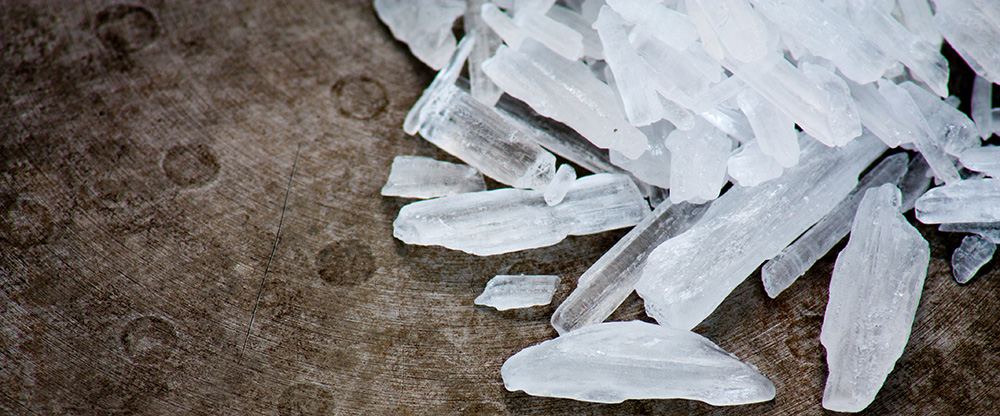Meth Addiction & Abuse
Crystal Methamphetamine, known as Meth, Crystal Meth & Ice was originally developed in Japan in the late 1800’s from Ephedrine, a drug commonly used to treat asthma.
Meth is a stimulant that is ingested or administered in many ways, usually it is smoked through a glass pipe but can also be swallowed, snorted and even injected intravenously. Meth is highly addictive and causes many problems to the individual and their loved ones. This guide will explore what meth addiction is, the signs and symptoms of meth addiction and the dangers associated with meth use. If you or someone you love can relate to the following guide, now could be a good time to seek treatment for meth addiction.
What is Meth Addiction?
Methamphetamine is highly addictive as it is fast acting and delivers a quick rush of euphoria, heightened awareness, hyper focus and floods the pleasure centres of your brain with Dopamine leaving you feeling confident, energetic and with a heightened libido.
Because Meth affects the central nervous system it has similar effects to other stimulants such as Cocaine or Amphetamines (Adderall).
- increased wakefulness and physical activity
- decreased appetite
- faster breathing
- rapid and/or irregular heartbeat
- increased blood pressure and body temperature
Even if you are a first time user, the need to recreate the ‘high’ can become all consuming and you can become addicted very quickly to meth.

Meth Addiction VS. Abuse
Meth is commonly known as a party drug, and you may have started using it socially but due to its fast acting, long term effects you may have ended up in a cycle called a “run”, sacrificing food and sleep whilst taking repeated doses every few hours for several days, this ‘binge & crash’ pattern involving meth can develop from abuse into addiction.
The sale of methamphetamine products from retail pharmacists was banned in the UK in 1968, and therefore no medical use for methamphetamine other than illicit purposes.
Methamphetamine was rescheduled from Class B to Class A of the Misuse of Drugs Act in 2006.
Drugs are put into one of three categories, according to how dangerous they are and the impact they have on society – not necessarily the individual. Class A drugs are classified by UK law as very dangerous.

What Makes Meth Addictive?
Methaphetamine has high abuse potential due to its powerful affects on the mind (Dopamine) which are short acting.
Within a few hours, meth will begin to wear off and the user will need more of it to maintain the same “high”.
Over time, tolerance begins to form and the user needs to take more meth to achieve the same high.
This cycle can continue for many meth users, to the point where an individual needs to take meth in order to feel “normal”.
How Meth Addiction Develops
Meth addiction can occur from the very first use but repeated exposure to the drug, easy access, trauma and existing mental health conditions can contribute to the development of addiction.
In the short term, Meth gives you an intense feeling of pleasure which is intoxicating but the crash that follows can leave you feeling depressed, irritable and disconnected.
Repeat Exposure
Regular use of Meth can lead to a psychological dependency which in term leads to a higher tolerance, you will need more and more of the drug in order to achieve a similar effect, although most times subsequent use can never recreate the very first ‘hit’.
Regular use of Meth depletes the Dopamine in your brain until you are unable to find pleasure without taking more Meth.
Trauma & Pre-existing Mental Health Conditions
The symptoms of meth addiction can exacerbate the symptoms of any existing mental health conditions you may have—including anxiety, depression, bipolar and PTSD.
Having both an addiction to Meth as well as suffering from a mental health issue is called a Dual Diagnosis, many studies have shown that, in many cases, users with a dual diagnosis of mental and substance use disorders have histories of abuse both sexually and physically as well as trauma.
You may feel you are blocking troublesome psychiatric symptoms by using Meth (i.e., self-medicating) and this thought process makes it difficult to stop using the drug.

A Family History of Drug Use
Whilst neurological and physical effects of Meth addiction have been widely documented and studied, the genetic risk factors for Meth abuse in genetics remains challenging and often contradictory.
The ‘Nature vs Nurture’ saying is better phrased as a ‘Nature and Nurture’ in the case of Meth addiction as research has shown a strong correlation between the environment you grew up in (family, social, education & economic) and the actual gene sequencing within your body.
Generally, positive family influences, such as family bonding and consistent rules, appear to reduce the risk of drug abuse among teens, while negative family influences tend to increase risk. The same is true of positive and negative peer factors
Signs & Symptoms of Meth Addiction
The signs and symptoms of a cocaine addiction include:
- Not caring about your personal appearance or grooming
- Obsessively picking your hair or skin – Meth causes slow healing in sores and pimples as well as an intense itching causing scratching
- Loss of appetite and weight loss – Meth is a know appetite suppressant
- Dilated pupils and rapid eye movement
- Strange sleeping patterns — staying up for days or even weeks at a time
- Jerky, erratic movements; twitching; facial tics; animated or exaggerated mannerisms; and constant talking – Commonly called ‘Tweaking’
- Borrowing money often, selling possessions, or stealing
- Angry outbursts or mood swings
- Psychotic behavior, such as paranoia and hallucinations, caused by the dopamine cell death in your brain.
Diagnosing Meth Addiction
Adequate assessment is needed in determining Meth addiction and the recommended treatment plan by trained professionals.
The CAGE Questionnaire is a simple screening questionnaire to identify possible addictions to alcohol and has been adapted to include drugs (CAGE-AID).
Questions you will be asked are as follows:
- 1. Have you felt you ought to cut down on your drinking or drug use?
- 2. Have people annoyed you by criticizing your drinking or drug use?
- 3. Have you felt bad or guilty about your drinking or drug use?
- 4. Have you ever had a drink or used drugs first thing in the morning to steady your nerves or to get rid of a hangover (eye-opener)?
A link for professionals to use is:
https://www.drugabuse.gov/nidamed-medical-health-professionals/screening-tools-resources/chart-screening-tools

The Dangers of Meth Addiction
The feelings created in your body and brain while taking Meth is very alluring and the temptation to recreate your first ‘hit’ and lose yourself again and again is high.
But repeated use of Meth has long term consequences and causes damage to both your mind and body in several ways:
Brain: Dopamine release is increased rapidly stimulating feelings of pleasure, motivation, increased libido as well as affecting your memory and problem solving skills.
Over time , as the Dopamine cells die you will find that you are unable to find pleasure, you may even start experiencing paranoia (extreme and unreasonable distrust of others) or even symptoms of psychosis.
Changes in brain structure and function leads to sleeping problems, memory loss and anxiety even hallucinations.
Heart: The risk of having a cardiac related episode is higher in both intensity and frequency as Meth raises blood pressure, speeds up your heart rate and constricts blood vessels. Due to bad dietary choices and Meth use the risk of high cholesterol further increases the risk to your heart
Immune System: If you are using an intravenous method to receive your Meth, you are at higher risk of catching HIV and Hep B & C. The risk of you being infected by pathogens such as the Coronovirus (Annals of Internal Medicine – 2020) due to the weakening of your body’s germ defense is also higher. Increased libido and compromised judgement may have lead you to engage in unprotected sex and increased your risk of contracting STD and HIV.
Kidneys: Meth is high in toxins that your kidneys have difficulty in breaking down, regular use of Meth can lead to kidney disease
Physical Appearance: Meth usage doesn’t only affect the inside of your body, your outward appearance can also be affected
- Skin – Due to the extreme itching and poor skin repair caused by Meth, your skin can end up with sores from excessive scratching and picking of your skin – especially on your face
- Teeth – There is a condition known as ‘Meth Mouth’ that you may have experienced that causes rapid tooth decay and gum disease, you will experience a clenched jaw, jaw pain and headaches and difficulty eating
- Extreme weight loss – Due to the appetite suppressive properties of Meth.
Meth Use in Pregnancy
Meth usage during pregnancy has been shown to increase risk of morbid maternal and neonatal outcomes such as:
- Low Apgar scores – Apgar stands for “Appearance, Pulse, Grimace, Activity, and Respiration.” In the test, five things are used to check a baby’s health. Each is scored on a scale of 0 to 2, with 2 being the best score
- Low Fetal Growth – Due to a loss of appetite in Meth users
- Infants exhibit delays in motor development – these delays may normalize by age 3 or 4.

Meth Addiction & Families
Any substance use disorder causes added stress in the Parent/Child relationship, but families of Meth users differ in several ways:
Due to the sexually stimulating, highly addictive nature of the Meth ‘binge & crash’ cycles, children are often exposed to a chaotic home where their parent/s are awake for days, have multiple sexual partners, experience chronic neglect and inconsistent parenting.
They may also witness their parent going through withdrawal symptoms (aggression, delusions, depression, paranoia etc).
Communities with a high prevalence of Meth usage, generally experience higher crime rates, rapid consumption of limited public funds and increased medical care required including hospitilisations:
In 2020 according to the Findings on NHS Digital there were:
- 7,027 hospital admissions for drug-related mental and behavioural disorders
5% lower than 2018/19 (7,376), but 21% higher than 2009/10 (5,809) - 16,994 hospital admissions for poisoning by drug misuse
6% lower than 2018/19 (18,053), but 9% higher than 2012/13 (15,580) - 99,782 admissions with a primary or secondary diagnosis of drug-related mental and behavioural disorders
3% higher than 2018/19, when there were 96,705 admissions.
Admissions were around 5 times more likely in the most deprived areas, compared to the least deprived areas
Substance Use Disorders and Employment
Meth Use and Employment
Methamphetamine use while working can inhibit your performance (even though Meth can make you feel hyper focused and energised) causing:
- unexplained or frequent absences
- a change in behaviour
- unexplained dips in productivity
- more accidents or near-misses
- performance or conduct issues.
It can also have legal implications especially if your job entails driving for the company as the UK traffic law prohibits driving while consuming or having consumed illegal drugs.
Penalties for drug driving
If you’re convicted of drug driving you’ll get:
- a minimum 1 year driving ban
- an unlimited fine
- up to 6 months in prison
- a criminal record
Your driving licence will also show you’ve been convicted for drug driving. This will last for 11 years.

Getting Help for Meth Addiction
The treatment for meth addiction involves a meth detox coupled with therapy to treat the underlying causes of addiction.
In cases where a Dual Diagnosis (addiction co-occurring with mental illness) both issues need to be treated concurrently for the best outcome.
There are two options for treatment: Inpatient (residential meth rehab) or outpatient programmes (free NHS services or private counselling).
You can start with your GP who will refer you to an outpatient service within your local area. Alternatively, you can call our team today to discuss the different options available to you.
There are also support groups available throughout the UK, such as those offered by Narcotics Anonymous (NA). Support groups are valuable for long term recovery, and should be part of any addiction treatment programme.
References & Useful Links
1. https://www.webmd.com/mental-health/addiction/crystal-meth-what-you-should_know#1
2. https://www.drugabuse.gov/publications/drugfacts/methamphetamine
3. https://www.drugwise.org.uk/methamphetamine/
4. https://www.mentalhelp.net/substance-abuse/meth/mental-effects/
5. https://www.drugabuse.gov/publications/drugfacts/genetics-epigenetics-addiction
6. https://www.webmd.com/connect-to-care/addiction-treatment-recovery/methamphetamine/signs-your-loved-one-is-addicted-to-meth
7. https://www.webmd.com/mental-health/addiction/crystal-meth-what-you-should_know#2
8. https://pubmed.ncbi.nlm.nih.gov/20664393/
9. https://www.healio.com/news/psychiatry/20180627/prenatal-methamphetamine-use-impacts-neonatal-outcomes
10. https://www.healio.com/news/psychiatry/20161109/prenatal-exposure-to-methamphetamine-and-tobacco-delays-motor-development
11. https://www.drugabuse.gov/nidamed-medical-health-professionals/screening-tools-resources/chart-screening-tools
12. https://www.ncbi.nlm.nih.gov/pmc/articles/PMC3211966/
13. https://www.ncbi.nlm.nih.gov/pmc/articles/PMC3211966/#B51
14. https://digital.nhs.uk/data-and-information/publications/statistical/statistics-on-drug-misuse/2020/part-1-hospital-admissions-related-to-drug-misuse
15. https://digital.nhs.uk/data-and-information/publications/statistical/statistics-on-drug-misuse/2020
16. https://www.nidirect.gov.uk/articles/drugs-and-crime
17. https://www.gov.uk/drug-driving-law
18. https://www.hse.gov.uk/alcoholdrugs/the-law.htm
19. https://www.ncbi.nlm.nih.gov/pmc/articles/PMC3148451/
20. https://www.nhs.uk/live-well/healthy-body/drug-addiction-getting-help/
